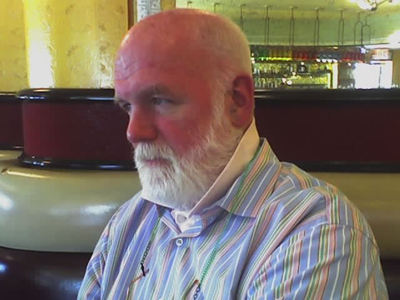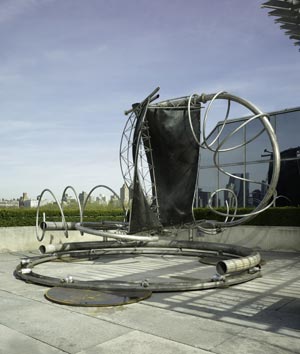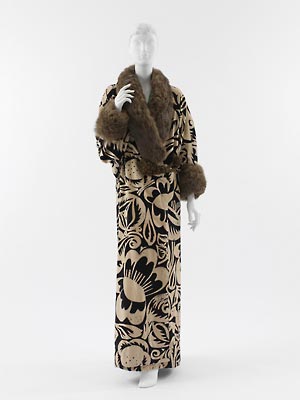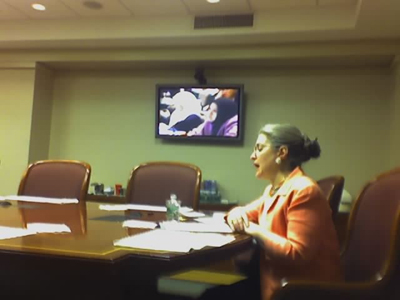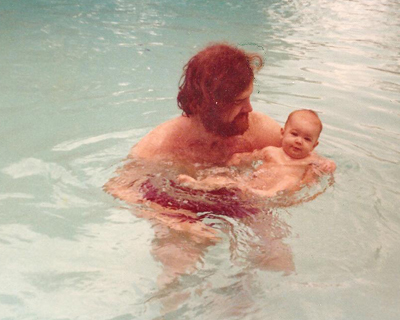In which we have a look at this week's
New York Times Book Review.
It was my intention to move the Book Review review to Portico
this week. And maybe I will.
As you know, The New York Times publishes books reviews daily, in its
Arts Sections. These reviews, written by a handful of Times reporters,
are completely independent (or appear to be) from the operation of the Book
Review. This means that, in theory at least, the newspaper can disagree with
itself. And that's what happened in practice when Michiko Kakutani's
cluelessly unsympathetic
review of Ian McEwan's On Chesil Beach ran in the paper a day
before Jonathan Lethem's
rave in the
Book Review reached home-delivery subscribers.
Yes
The following titles appear to deserve coverage in the Book
Review. The reviews may still be inadequate or useless.
On Chesil Beach, by Ian McEwan. Jonathan Lethem's review is
unquestionably the best that I have read in the Review since I began
reviewing it. There are great, generous quotations from the text, which Mr
Lethem then comments on in interesting ways. Having noted that Mr McEwan has
absorbed, and not felt challenged by, the narrative challenges to the novel that
are posed by psychoanalysis and cinema.
In fact, McEwan may in retrospect be seen as the quintessential
example of the recent integration of scientific interest into fiction,
precisely because in McEwan (as opposed to, say, Richard Powers) such
matters cease to be in any way remarkable.
A Day at the Beach, by Helen Schulman.
Sarah Waters praises this 9/11 book as "finely wrought, deeply felt and
mercifully funny," but indulges in eclipsing storytelling.
The Speed of Light, by Javier Cercas (translated by Anne McLean).
Natasha Wimmer is persuasive in a short space about this Spanish novel set
largely at the University of Illinois at Urbana.
In The Speed of Light, Cercas demonstrates that
sophistication and sentiment are not mutually exclusive, and that history
demands emotional engagement. At the same time, he proves (to his readers
and to himself) that it is possible to delve into the tricky question of
success without succumbing to hopeless narcissism.
Contested Water: A Social History of Swimming Pools in America, by
Jeff Wiltse. Dick Cavett winds up this sympathetic review with characteristic
modesty.
I fear I lack the art of book reviewing. I don't know how to
convey the sweep of the social history of this book, or its emotional color.
At the end, Wiltse laments the passing of the great romantic pools and
recalls his own experience of one in Seattle. They're his most cherished
childhood memories. Finishing Contested Waters, I felt I'd had a good
course in America. All its traits, fine and lamentable are found here - the
most vivid being our stinking racism.
Liberty: The Lives and Times of Six Women in Revolutionary France, by
Lucy Morris. Judith Warner indulges in excessive storytelling here, but she does
call the book "marvelous."
Empire of Blue Water: Captain Morgan's Great Pirate Army, the Epic Battle
for the Americas, and the Catastrophe that Ended the Outlaws' Bloody Reign,
by Stephan Talty; The Sack of Panama: Captain Morgan and the Battle of the
Caribbean, by Peter Earle; and The Republic of Pirates: Being the True
and Surprising Story of the Caribbean Pirates and the Man Who Brought Them Down,
by Colin Woodard. Candice Millard makes the case that these are all serious and
intelligent looks at the most mythical figures of modern times.
In the three centuries that have passed since pirates and
privateers struck fear in the hearts of every ship captain, passenger, and
crew member, these scoundrels have somehow become popular symbols of bravery
and daring. But the appalling too of their predations leaves little room for
nostalgia. What these three books offer, beyond rip-roaring adventure
stories from a distant past, is an opportunity to understand pirates as they
truly were - and to be grateful that the worst of them, at least, are gone.
The Fragile Edge: Diving and Other Adventures in the South Pacific, by
Julia Whitty. Holly Morris calls this a "quietly ambitious, if sometimes
meandering book.
Whitty’s prose is supple and scientifically informed (a rare and
graceful mix), and her intimacies with the ocean’s curiosities captivate.
The less charming and more sobering subjects — say, the atrocities of
cyanide fishing; or an island nation at 12 feet above sea level that is
quite literally drowning in the juggernaut of
global warming; or France’s vast
atmospheric nuclear testing in Polynesia (which caused birth defects in
newborns and turned reefs into nuclear waste dumps) — provide a visceral
understanding of humanity’s relationship with the oceanic world.
Fathers and Sons: The Autobiography of a Family, by Alexander Waugh.
This book, by the famous novelist's grandson, looks back a generation further,
to Arthur Waugh, who much preferred his other son, Alec, to Evelyn. According to
Christopher Hitchens, Mr Waugh has a truly "Wavian" eye.
About Alec’s children he adds: “He was friendly and polite with
them, he did not argue with their mother and seldom disciplined them. Once
he picked Peter up and hurled him out of a window, but that was an
aberration and he felt guilty about it for the rest of his life.” The
deadpan tone here shows Alexander to be a true and worthy descendant of the
line. The genius of Evelyn Waugh, apart from the combination of “faith and
frivolity,” was his ability to be hilariously heartless. (One thinks of the
risible injustices he inflicts on his characters, from Paul Pennyfeather in
“Decline and Fall” onward.) Alexander Waugh has a good eye for the real-life
version of this trope. In one single paragraph he has his grandfather
referring to his dyslexic fifth child, Harriet, as “my dud daughter,” and
poisoning another child’s pet rabbits with vodka during the Christmas
festivities. When his son Auberon was horribly injured while serving as a
soldier in Cyprus, Evelyn chose the moment of his hospitalization to cut off
the young man’s allowance. His belief in original sin mutated into a
campaign to make sure that life was understood, and indeed experienced, as
unfair.
Alice Waters and Chez Panisse: The Romantic, Impractical, Often Eccentric,
Ultimately Brilliant Making of a Food Revolution, by Thomas McNamee. Patric
Kuh's review convinces me that this is not just another book about cuisine.
If Chez Panisse transformed American dining it is thanks to the
passions of the people who have been part of it, particularly Waters.
Because of her openness to the personal side of cooking, her ability to
embrace it whatever confusion might result, Waters forced gastronomy down a
more modest path. For the first time in this country, cuisine could mirror
one’s own life and beliefs. And that would be the new way.
From a Cause to a Style: Modernist Architecture's Encounter With the
American City, by Nathan Glazer. Kevin Baker present this book as an
indispensable look at something not so funny that happened on the way to the
Forum: modernist architecture, despite its highly visionary quality, rarely
worked in cities.
Glazer argues that “the architect today ... aims at seeing
himself as an artist, as he indeed always did.” But Modernist architects by
their very nature refused to be bound by tradition. “They were all too ready
to wipe away what existed and start with a clean slate,” and therefore
“failed to explore just what it is people find attractive in areas and
buildings.” Freed from any past, they give us public monuments that seem
meaningless, housing projects that take no account of community, works that
constantly favor artistic bravura over any sense of a pleasing, sustainable
living environment.
Maybe
It is difficult to tell whether these books are actually as
indifferent or pointless as the reviews suggest.
After Dark, by Haruki Murakami.
Walter Kirn tries to praise this book but can't come up with anything
compelling. He complains, moreover, of "disruptive and distracting" dream
episodes.
The Big Question, by Chuck Barris.
Neil Genzlinger's surprise at finding Chuck Barris to be "an excellent juggler,
deftly creating an assortment of eccentrics and misfits who find themselves on
paths that converge in "The Big Question" greenroom. Well, who would know better
from game shows? "If Barris, like his bigoted alter ego, is in fact a bitter old
man, he's a darn funny one."
Right Livelihoods: Three Novellas, by Rick Moody. Liesl Schillinger
tries her best, but you can hear the air leaking out of her final paragraph, as
she writes about one of the novellas that this book comprises:
“K&K” may lack the pathos that would make it bloom, but it’s
still rich in arid humor and has the indestructible, if potted, vitality of
a cactus on a receptionist’s desk. Even here, Moody never puts a foot wrong;
he just sends his character down a path that’s too well worn. It’s his own
fault — and accomplishment — that we’ve come to expect him to break a new
path every time he invites us on a journey.
Summer Reading, by Hilma Wolitzer.
Anne Mendelssohn wants to speak highly of this book about a book-club in the
Hamptons, but from the moment she
applies the words "pastel-shaded mode" to it, its literary quality is left in
doubt.
The Best Place to Be, by Leslie Dormen; and
Tourist Season: Stories,
by Enid Shomer. Alex Kuczynski. Ms Kuczynski likes these books, and she finds
Tourist Season "a more ambitious literary attempt" than The Best Place to
Be, her review is rather easygoing.
The Ministry of Special Cases, by Nathan Englander. Will Blythe starts
off his review with nearly reverential tones, but by the end he has exposed a
problem with this novel, which is set in Argentina's Dirty War. It would have made more sense to begin with the problem
and then to answer his own questions one way or the other. Here's the final
paragraph:
Doesn’t the larger-than-life quality of the fable employed here
make the disappeared disappear again, not into the sea but into a fairy tale
of redemption and continuity? Englander softens the jagged edges of history
too much; the Dirty War becomes a stage set for explorations of identity.
Beautifully written, “The Ministry of Special Cases” nonetheless presents a
conundrum. Englander does in fiction what his absent God cannot: create a
world. And then he peoples that world with characters that he treats better
than history ever would. Such decency is not a large failing in a young
novelist. If only the junta had been half so kind.
April in Paris, by Michael Wallner.
Joseph Finder suggests that this novel about a German in wartime Paris is Alan
Furst lite. "Like its protagonist, adrift between two worlds, it can't quite
decide what it wants to be." That's not very helpful to anybody.
Inglorious, by Joanna Kavenna. The problem with this novel, according
to Sarah Churchwell, is that it is trapped by its subject.
Without a doubt, Kavenna successfully renders depression. What’s
less certain is whether successfully rendering depression renders a novel
successful. Change and conflict provide a story’s oxygen; without them, it
chokes.
Unless I missed something, Ms Churchwell nowhere
suggests how this book ends.
A Thousand Splendid Suns, by Khaled Hosseini. Lisa See's review tries
to have things both ways. The book is ambitious; it is also easy to read.
Storytelling takes the place of examination; the grain of Mr Hosseini's writing
is not conveyed. And what is one to make of this? (Notice the opening "Yet."):
Yet Hosseini succeeds in carrying readers along because he
understands the power of emotion as few other popular writers do. As he did
in “The Kite Runner,” he uses a melodramatic plot to convey vividly the many
aspects of love and the ways people sacrifice themselves for those they hold
dear. With “A Thousand Splendid Suns,” Hosseini has shown that he doesn’t
intend to be a one-hit wonder. It will be interesting to see where he goes
from here.
Opening Day: The Story of Jackie Robinson's First Season, by Jonathan
Eig. The story of Branch Rickey's carefully calculated introduction of a gifted
black player onto the roster of the Brooklyn Dodgers is an important story in
the history of American race relations, but, according to Jay Jennings, Mr Eig's
"analysis and prose are hit-and-miss.
Ingrid: Ingrid Bergman: A Personal Biography, by Charlotte Chandler.
Howard Hampton warns film buffs that this book is "useless as an artistic
overview," but goes on to say that it "gradually uncorks some enjoyably
incidental oral history." Nothing could define a "Maybe" book better than good
film gossip without intelligent film commentary.
The Life of Kingsley Amis, by Zachary Leader.
What am I thinking? Surely this book deserves to be among the Yeses? And yet A O
Scott's review is not the first one that I've read that recommends reading
Kingsley Amis in lieu of reading Mr Leader's diligent but "bland and
bloodless" portrait of the author as an industrious sensualist.
Josephine Baker in Art and Life: The Icon and the Image, by Bennetta
Jules-Rosette. Kaiama Glover seems to like this book, but the snippets that she
quotes are charged with the dreaded jargon of Theory.
Ruffian: A Ractrack Romance, by William Nach. Eric Banks argues that
this isn't just a book about a horse, but one about a shift in the culture. The
grim end of Ruffian's career at Belmont in 1975 appears to have marked the
beginning of the long decline of New York's racetracks.
In looking back at that halcyon year with Ruffian and its
horrific denouement, Nack is ever a sensitive observer, and by 1975 he knew
something had changed in the sport. (Match races will have that effect: they
are the sport at its most atavistic, with the all-out head-to-head
competition akin to that of an 18th-century blood sport.) The breeding
industry had emphasized speed over stamina — “These were the termites in the
walls of the breed. Ruffian was not without her own nest of them” — with a
resulting rise of fatal breakdowns. Watching the ministrations to a dying
gelding, he writes, he began to see not “the old romantic notion, shaped by
those summers” in Chicago “and all that reading I had done in college,” but
“a picture framed by cannon bones and inked in darker and more somber hues.”
When he witnessed the stricken Ruffian, in shock and pain before being
euthanized, that ink had fully dried. Some might scoff at describing the
demise of a horse (and all she symbolized) as a tragedy, but Nack’s requiem
— for the animal, for his feelings — summons nothing less.
Dog Years: A Memoir, by Mark Doty. Danielle Chapman admires the poet
Mark Doty, but feels that this memoir, covering events memorialized in fine
poems, trivializes them.
It’s no surprise, really, that a poet’s memoir about his dogs
would turn into a book about mortality. Nor is it surprising that events
that seem quite ordinary from the outside would be felt with this degree of
intensity by a poet. But with its breathless aestheticizing of dog life, its
melodrama and its rehashing of old material, “Dog Years” often comes
dangerously close to parodying Doty’s best work. While one never doubts the
authenticity of Doty’s love for his dogs, one does doubt the wisdom of
attempting to turn all of this into the stuff of high tragedy.
It doesn't seem to cross Ms Chapman's mind that Mr Doty might be trying to
widen his audience, to include folks who just don't read poetry.
Spy Wars: Moles, Mysteries and Deadly Games, by Tennent H Bagley. Evan
Thomas's review is something of a mess, because it tries to follow Mr Bagley
into the funhouse mirrors of counterespionage. The accompanying photograph of
James Jesus Angleton is mystifying at best.
Redemption Song: The Ballad of Joe Strummer, by Chris Salewicz. Robert
Christgau's extremely insidery review of this book about one half of the team
that produced the best songs in the repertoire of the band, The Clash. His
appraisal of the book is far from enthusiastic.
I’ve paged through music biographies far klutzier than Salewicz’s
and gratefully come away with what I needed. But for a labor of love, this
one’s a serious struggle. When I referred back to Jon Savage’s Sex
Pistols-centered punk history, “England’s Dreaming,” my eye was caught by
the clause “the slow death by suffocation that is all too often the
emotional experience of living in England.” While this well-put truism is
hardly the crowning moment of Savage’s excellent book, not once had I
encountered prose as striking in Salewicz. Then I looked for the kind of
interview quotes that clutter “Redemption Song” and found, not to my
surprise, that Savage’s were sparer and briefer. A quick check of music bios
I admire — of Bing Crosby, Dean Martin, Sam Cooke, Sun Ra, Janis Joplin,
Sylvester — revealed that not one used supporting quotations even as much as
Savage.
If you think that's bad, just wait a paragraph,
where Mr Christgau follows up the suggestion that Mr Salewicz ought to have
relied a bit less on quotations with this corker: "But then he would have been
compelled to share more of his own thoughts, and they are not his strength."
Shroom: A Cultural History of the Magic Mushroom, by Andy Letcher.
Dick Terani writes that this book is so engaging that he went out and tried to
find some psilocybes. He doesn't claim to have ingested any, but then neithere
has Mr Letcher, whose principal objective seems to be clearing away a lot of the
suppositious mythology about the use of "magic mushrooms" in ancient history.
Considering Doris Day, by Tom Santopietro.
Reviewer (and singer) Nellie McKay is clearly a big, big fan of Doris Day. She
doesn't have much to say about this book, unfortunately. She calls it
"sympathetic" and "knowledgeable," but she doesn't care for his overuse of pat
phrases. It would be tempting to mistake her enthusiasm for Mr Santopietro's
subject as a vote for his book, but, on balance, intuition suggests otherwise.
No
These books, if they deserve coverage at all, ought to grace
other sections of The New York Times.
Rant, by Chuck Palahniuk. Field Maloney writes,
Even his admirers may be disappointed by “Rant.” As a project, it
has a dialed-in, flabby air. The sci-fi conceits are derivative and give the
plot a hoary implausibility (and I’m not even addressing his “Michael
Crichton for the Utne Reader set” conspiracy theories about Henry Kissinger,
AIDS and Africa). Palahniuk has always been more sensation artist and
cultural vacuum than storyteller. His characters aren’t developed so much as
given colorfully grotesque and morbid mannerisms and back stories. Sometimes
he gets away with this by force of an assured voice and a febrile
imagination: “Fight Club” had a cold stylish gleam; at some level its
fantasies seduced. Take that away and all that’s left is shock as shtick.
The Horse God Built: The Untold Story of Secretariat, the World's Greatest
Racehorse, by Lawrence Scanlan. Bill Barich's review suggests
that this book is more about Shorty Sweat, Secretariat's "devoted groom," than
it is about the famous thoroughbred, but adds that Mr Scanlan "doesn't bring
Sweat to life."
It's Good to Be the King: The Seriously Funny Life of Mel Brooks, by
James Robert Parish; and Rickles' Book, by Don Rickles, with David Ritz.
These books may be much better than Liz Brown's review suggests, her praise
notwithstanding. They come off here as gift books for curmudgeonly
convalescents.
